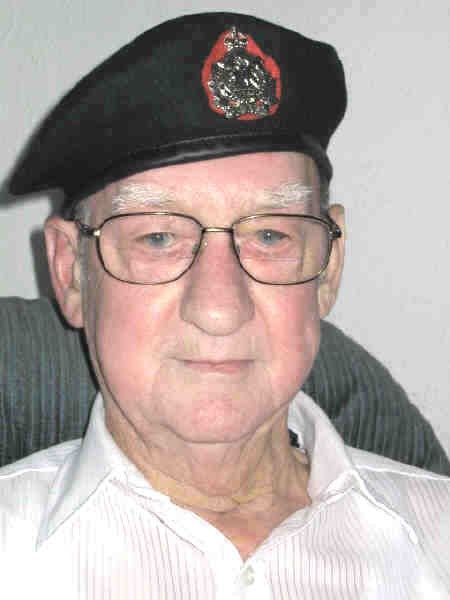Ernie Etches, of North Bay, as a fresh-faced member of the Algonquin Regiment. Etches landed on Juno Beach in July of 1944, a month after the D-Day invasion.
Ernie Etches, of North Bay, as a fresh-faced member of the Algonquin Regiment. Etches landed on Juno Beach in July of 1944, a month after the D-Day invasion.___________________________________________
Ernie Etches has never forgotten Hill 195, and the death and dismemberment he saw all around him 60 years ago in France.
Last ones to landEtches, who's been retired from the Ontario Northland Railway for 22 years, landed on Juno Beach, Normandy in July of 1944 about a month after the D-Day battle which changed the course of World War II.
Just 22 at the time, Etches had been a member of the Algonquin Regiment, and his company was part of the Canadian army's Fourth Armoured Division.
"We used to go in along with the tanks, but we were the last ones to land on Juno Beach because we were armoured," said Etches, 82, during an interview in his Aubrey Street home.
First nosebleedThe first thing Etches recalls seeing on the beach upon landing "was lots of men, and two houses, one of which had a big hole in it."
While Etches arrived too late to participate in D-Day, he would be part of another military maneuver.
Operation Totalize was a ground attack on Aug. 7,1944, by Canadian and Polish forces to breakout from the Normandy beachhead along the Caen-Falaise road. Although the attack failed in its objective, it did serve as a spoiling attack, disrupting German forces massing for the Operation Lüttich attack.
"We really started just outside of Caen and went to a place called Tilly-la-Campagne, and that's where we got our first nosebleed," Etches said.
"The Germans had a good force there and it was hard to break through, but as the battle progressed we were able to move on until we encountered Hill 195."
The wrong turnThe hill was the highest piece of ground on the road from Caen to Falaise, and identified as a strategically vital point.
Its capture was delegated to the Worthington Force, which consisted of the 28th Canadian Armoured Regiment and three companies of the Algonquin Regiment, Etches among them.
Due to the confussion of war, though, they ended up some four miles east of their objective and within 1,000 yards of a 12th SS battle group equipped with Tigers and Panthers.
"We made the wrong turn, took a left instead of a right," Etches said
That error left Etches and his company behind a German Panzer division, he said, "and we really got pounded."
Shrapnel would come downEtches remembers being dug in the trenches when the German artillery started fire.
"It was so loud we could hardly hear anything. They circled us and the shells would skip over our heads and explode and the shrapnel would come down on us," Etches said.
A 1999 article by Terry Copp, published in Legion magazine, quotes a German lieutenant captured by the British Columbia Regiment describing what it was like to be in the Canadian position:
"Tigers and Panthers advanced in order to encircle the positions on the hill. One Canadian tank after another was knocked out and ended up in smoke and flame. Some crews...tried to reach a small woods close by."
Lost his lifeEtches recalls late North Bay city councilor Don King being hit by shrapnel, "and it took the side of his face off."
"Then Eddie Weiss lost his arm, and Cec Rogers lost his life, and Paul Shred lost his, and a lot of others from North Bay who I'd joined the army with," Etches said.
"We knew we had to get out."
Etches grabbed his rifle and began crawling along the ground on his belly.
"We just kept crawling not even knowing if we were going in the right direction or not," Etches said.
"Some of us made it, some of us didn't."
Only 43 of the 108 men in his company ended up surviving, Etches said.
Remarkably he was uninjured during the melee.
Another shellackingLt.-Col. Dave Stewart’s Argyll and Sutherland Highlanders of Canada eventually took the hill, Aug. 11 1944.
Meanwhile Etches and the remainder of his company regathered and continued their March toward Germany eventually entering Belgium, hitting a lot of hard pockets of fighting including at the Leopold Canal.
"That's where we got another shellacking," Etches said.
"We lived in the mud for two or three weeks, and it was wet and cold."
Saw my daughterPromoted to a warrant officer from a private by this time, Etches stayed in Europe until 1945, and returned home to North Bay on Sept. 21.
"That's when I saw my daughter for the very first time," Etches said.
"She was two-and-a-half by that point."
Within two months Etches got his job at the ONR.
Good young menAlthough he survived the war, Etches said he's never had any desire to return to Normandy, despite having had two opportunities to return all expenses paid.
"I guess I'm a little bit sensitive when it comes to remembering the war, because I lost a lot of friends and saw a lot of good young men die," said Etches, who'll be participating in D-Day sixtieth-anniversary proceedings Sunday at the North Bay Legion.
Etches said he often thinks "about those guys," particularly on Remembrance Day or June 6, "but like everything else you learn to live with it."
And he believes the freedom that resulted from war was worth the pain and bloodshed.
"We were a little more patriotic then, but yes it was worth it because I woudn't have wanted to live under German rule, not after seeing what I'd seen," Etches said.
"But I guess I was one of the more fortunate ones because I helped to fight them off."



